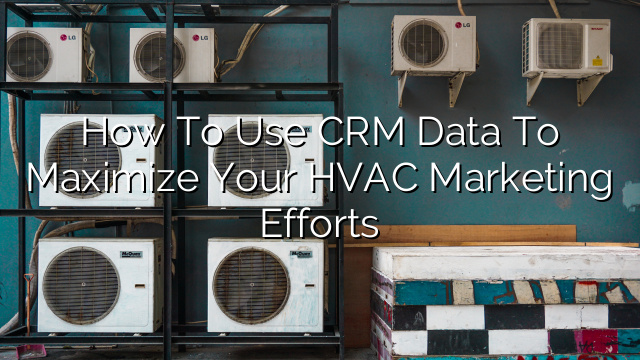Why HVAC Needs CRM
In today’s fast-paced and highly competitive business environment, customer relationship management (CRM) software has become an essential tool for businesses across various industries. The HVAC industry is no exception. Implementing a CRM system can significantly benefit an HVAC business by streamlining operations, improving customer service, and boosting sales. In this article, we will explore the importance of CRM for HVAC businesses and how it can help them thrive in a highly competitive market.
The role of CRM in the HVAC industry
1. Improved customer service:
One of the key advantages of using CRM software for HVAC businesses is that it allows them to provide superior customer service. By storing detailed customer information in a centralized database, HVAC companies can easily access customer history, including previous service calls, preferred communication channels, and any special notes or requests. This enables HVAC technicians to deliver personalized service and cater to their customers’ specific needs, leading to increased customer satisfaction and loyalty.
2. Streamlined operations:
CRM software can help HVAC businesses streamline their day-to-day operations. With features like appointment scheduling, dispatch management, and automatic reminders, HVAC companies can ensure that technicians are assigned to jobs efficiently and that customers are kept informed about the service schedule. This not only improves overall operational efficiency but also minimizes the risk of scheduling conflicts or missed appointments.
3. Enhanced sales and marketing:
A CRM system can provide HVAC businesses with valuable insights into customer behavior and preferences. By analyzing customer data, HVAC companies can identify trends, anticipate customer needs, and tailor their sales and marketing strategies accordingly. For example, if the CRM system indicates that a customer’s HVAC unit is nearing the end of its lifespan, the business can proactively reach out to the customer with a targeted offer for a replacement unit. This proactive approach can help HVAC businesses upsell and cross-sell their products and services, leading to increased revenue and profit.
Choosing the right CRM for HVAC businesses
When selecting a CRM system for an HVAC business, it is crucial to consider the specific needs and requirements of the industry. Here are a few key factors to keep in mind:
- Industry-specific features: Look for a CRM system that offers features tailored to the HVAC industry. This may include functionalities like equipment tracking, warranty management, and service contract management.
- Integration capabilities: Ensure that the CRM system can integrate seamlessly with other software and tools your HVAC business is using. This will prevent data silos and enable smooth data flow between different departments.
- User-friendly interface: The CRM system should be intuitive and user-friendly to encourage adoption and ensure that all employees can use it effectively. A complex and cumbersome interface can hinder productivity and lower the overall ROI.
- Scalability and customization: Choose a CRM system that can scale with your HVAC business’s growth and can be customized to meet your specific requirements. This flexibility will ensure that the CRM can adapt to evolving business needs and processes.
FAQs
- Why should HVAC businesses invest in CRM?
Investing in a CRM system can help HVAC businesses improve customer service, streamline operations, and enhance sales and marketing efforts. It allows businesses to store customer information, schedule appointments, track equipment, and gain valuable insights into customer behavior.
- How can CRM software improve customer service for HVAC businesses?
CRM software enables HVAC businesses to access detailed customer information, such as service history and preferences, allowing technicians to deliver personalized service. It also facilitates effective communication with customers, ensuring they are informed about service schedules and updates.
- Can CRM software help HVAC businesses increase sales?
Yes, a CRM system can help HVAC businesses increase sales by providing valuable insights into customer behavior and preferences. These insights enable businesses to tailor their sales and marketing strategies, identify upsell and cross-sell opportunities, and proactively address customer needs.
- Are there industry-specific CRM systems for HVAC businesses?
Yes, there are CRM systems specifically designed for the HVAC industry. These systems offer industry-specific features such as equipment tracking, warranty management, and service contract management.
- Is it challenging to implement a CRM system for an HVAC business?
Implementing a CRM system for an HVAC business may require some initial effort and resources, such as data migration and training. However, with proper planning and support from the CRM provider, the implementation process can be relatively smooth, and the long-term benefits outweigh the investment.






